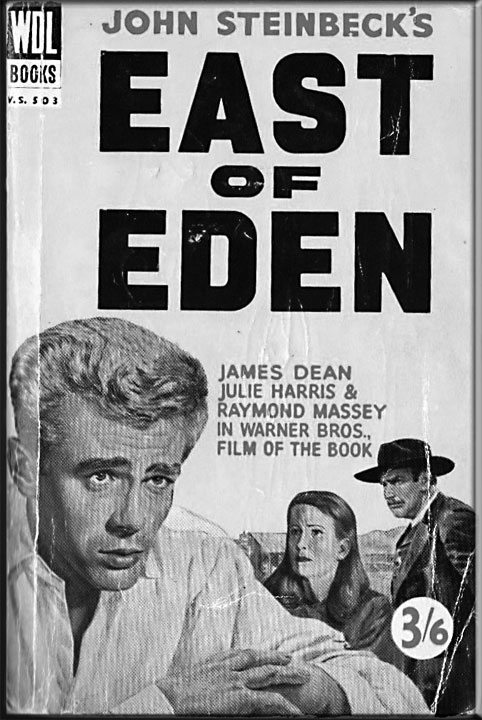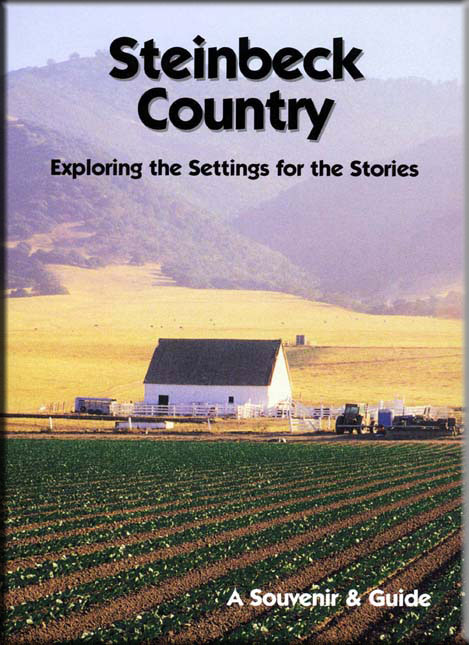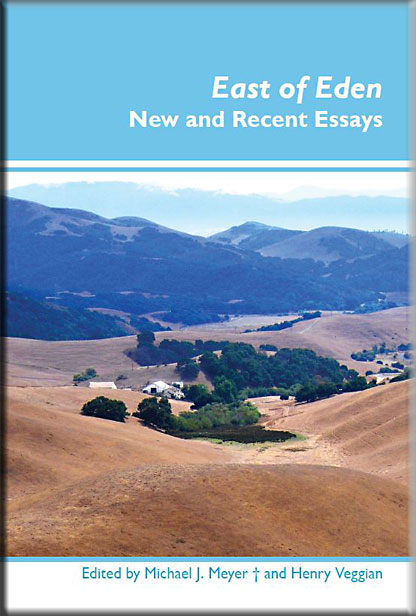 My journey from East of Eden to Silicon Valley and Steinbeck Country began in the early 1960s. One summer I worked in a west London warehouse that stored spare parts for a Royal Air Force aircraft maintenance unit, helping the aged custodian move engine parts and other heavy objects during a business slowdown. Not many RAF planes seemed to be in distress, so I had plenty of time to read on the job. One day my boss picked up a worn paperback novel and tossed it to me: “Here, catch this. It’s got some dirty bits in it. You might like it.”
My journey from East of Eden to Silicon Valley and Steinbeck Country began in the early 1960s. One summer I worked in a west London warehouse that stored spare parts for a Royal Air Force aircraft maintenance unit, helping the aged custodian move engine parts and other heavy objects during a business slowdown. Not many RAF planes seemed to be in distress, so I had plenty of time to read on the job. One day my boss picked up a worn paperback novel and tossed it to me: “Here, catch this. It’s got some dirty bits in it. You might like it.”
It Started in England with East of Eden
A semi-clothed maiden on the well-thumbed cover promised the pleasures of a “bodice ripper”—not my usual choice of reading material. But having swept the aisles for the day and with nothing else to do, I dug into my first Steinbeck novel. Yes, there were a few racy bits to be found in To a God Unknown, but the bold writing style and the imagination behind the storytelling captivated me far more. By the end of the summer I’d read every book by John Steinbeck I could find, including East of Eden. I still have the yellowing paperback copy with James Dean and Julie Harris on the cover that set me back three shillings and sixpence from my warehouse wages.
Images of “light gay mountains full of sun and loveliness” and hot, dry afternoons near Jolon in Steinbeck’s Valley of Nuestra Señora proved particularly appealing during that typically cold, damp English summer. I vowed that one day I would travel to California and see Steinbeck Country for myself. It was a promise I would keep in my five-decade odyssey from England to Silicon Valley and Steinbeck Country. I even got an unanticipated boost along the way from the Oprah book club—but that lay far in the future.
Stop #1: Silicon Valley
After graduating from college with a degree in physics, I found employment in England in the booming new business of semiconductor electronics. Within a few years I was working for a European affiliate of Fairchild Semiconductor, the Mountain View company that spawned Intel and other Silicon Valley “Fairchildren” startups. Sensing that the real action in the buoyant computer chip industry was in California, after several years working in England I negotiated a transfer and arrived in San Francisco in 1968. It was the first stop in my Silicon Valley-Steinbeck Country-Oprah book club journey.
Although I only planned to stay in California for a couple of years, I continued to live and work in Silicon Valley until I retired 15 years ago. During that time the Santa Clara “Valley of Heart’s Delight” morphed into Silicon Valley, and the microchip business evolved from maverick entrepreneurial startups run by cowboys with clipboards to strategic assets managed by nation states.The number of transistors on a silicon chip swelled from a dozen or so to more than one billion, and Silicon Valley became an international brand.
I visited Steinbeck Country—the agricultural Salinas Valley, the fishing town of Monterey, and peaceful Pacific Grove—several times during the early years of my Silicon Valley career. I walked the hallowed length of Monterey’s Cannery Row, peered into Steinbeck houses in Monterey, Pacific Grove, and Salinas, and hiked some of the lower trails into the Big Sur country, the setting for Steinbeck’s story “Flight.” I also took classes from the well-known photographer Steve Crouch, inspired by his classic 1973 coffee-table volume, Steinbeck Country.
Back in the days before the National Steinbeck Center, Salinas was a sleepy stop on the road south from Silicon Valley. Cannery Row was showing early signs of recovery as a tourist destination from the collapse of the sardine industry predicted by Steinbeck and his best friend, the marine biologist Ed Ricketts. But I remained a captive of the Silicon Valley siren call until retiring in 1998. By then much had changed in Steinbeck Country, home turf for the author of East of Eden, since my early trips down Highway 101 from Silicon Valley.
Stop #2: Steinbeck Country
When I retired I began to submit day-trip features to the travel sections of the San Francisco Chronicle and the San Jose Mercury News, including an article on Salinas, where the National Steinbeck Center had recently opened. That event was international news, but travel-section advertisers failed to find the destination compatible with selling big-ticket vacation cruises, and neither paper took my piece on Steinbeck’s hometown. I was beginning to understand how Steinbeck felt before his first book was accepted.
Eventually I sent my effort to Susan Shillinglaw, a professor of English at San Jose State University and at that time the director of the Center for Steinbeck Studies. She published my article—“Something to Do in Salinas”—in the fall 2001 issue of Steinbeck Studies, and she invited me to show slides of places in Steinbeck Country related to Steinbeck’s fiction at the Steinbeck Centenary Conference, held on Long Island at Hofstra University in 2002. Steinbeck wrote much of East of Eden in his Manhattan apartment; eventually he also bought a house in Sag Harbor, the Monterey-like fishing village on Long Island that provided the setting for The Winter of Our Discontent.
Following my presentation at Hofstra several attendees asked for copies of the images I’d shown. I used an early-generation digital camera with a state-of-the art two-megapixel sensor to take my pictures, and copies could only be printed at postcard size. Naturally I was eager to find a way to satisfy Steinbeck lovers who wanted permanent images of Steinbeck locations, and eventually I settled on a format that allowed several small photos to be printed per page in the book I produced.
Published in 2003 as a low-cost souvenir and travel guide, Steinbeck Country: Exploring the Settings for the Stories sold steadily at the National Steinbeck Center, online, and through other outlets. After Susan included a page about the book on the website she edited for the Oprah book club selection of East of Eden later that year, sales spiked.
Stop #3: The Oprah Book Club
Exposure on the Oprah book club website generated invitations from community book clubs and libraries for presentations about Steinbeck Country. It ultimately led to new Steinbeck Country travel-writing and photography opportunities as well, along with requests to provide images for academic publications such as East of Eden: New and Recent Essays, a recent collection of scholarly articles edited by Henry Veggian and the late Michael J. Meyer.
But the market for printed travel titles has changed dramatically since I published my guide book 10 years ago. Today digital versions are preferred over print because of their portability, flexibility, and ease of updating. To serve the growing market for mobile-device apps, I partnered with the National Steinbeck Center to transfer the book’s content to digital format.
Introduced at the Steinbeck Festival in May of 2013, the Steinbeck Country & Beyond app contains over 200 pages and almost 1,000 images, compared with only 32 pages and 100 or so photos in the printed book. An easy-to-use mobile reference and travel guide to Steinbeck’s works and the people and places that inspired them, the app is available from Apple’s iTunes App Store and on Google’s play for Android platforms. There is also a website version for readers who do not have access to a smartphone or a tablet.
Only a writer as creative as Steinbeck could have predicted 50 years ago where my path would lead. From reading East of Eden in England to a career in Silicon Valley and retirement in Steinbeck Country—with an unanticipated boost from the Oprah book club along the way—my story continues to surprise even me.



